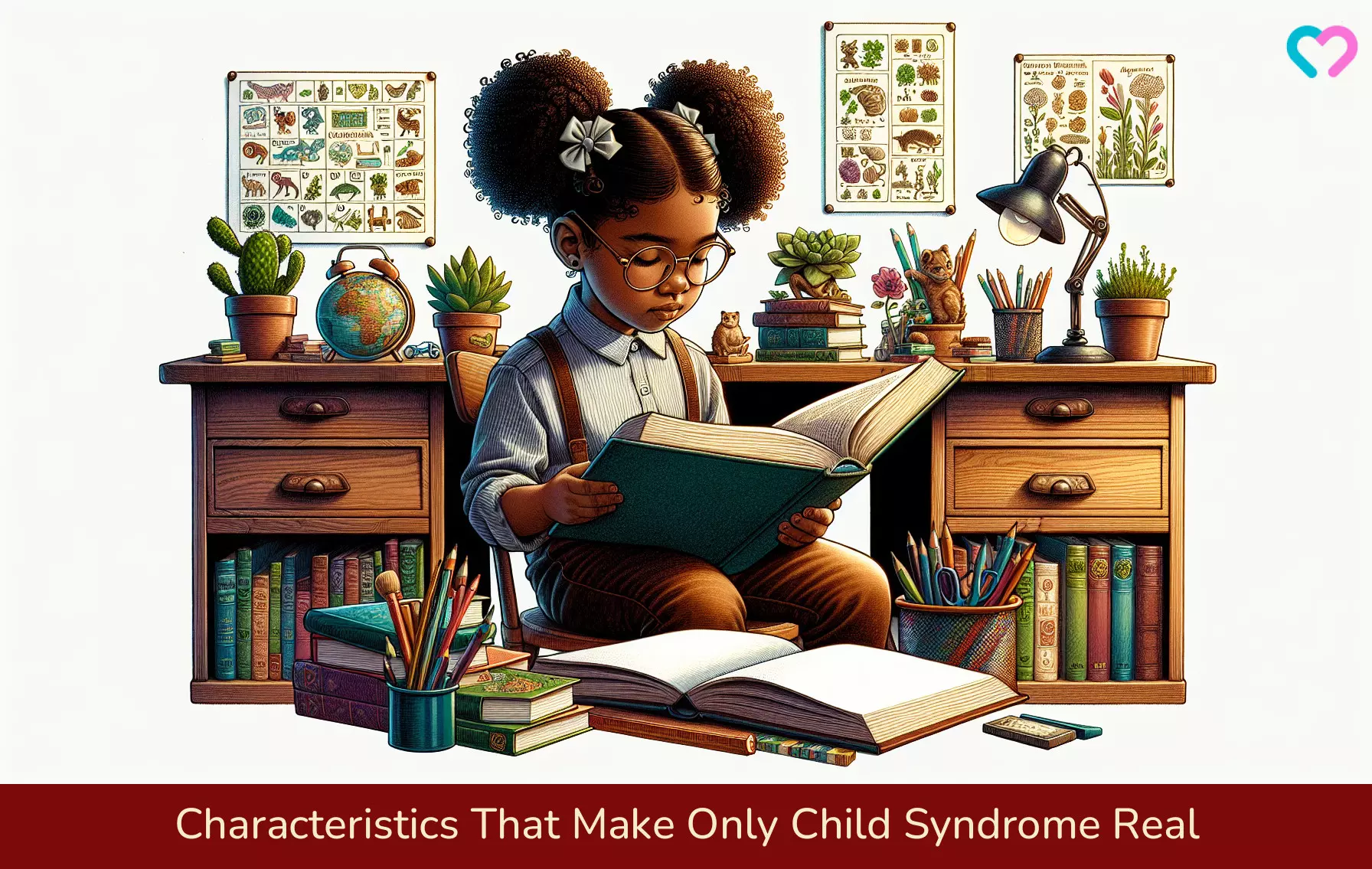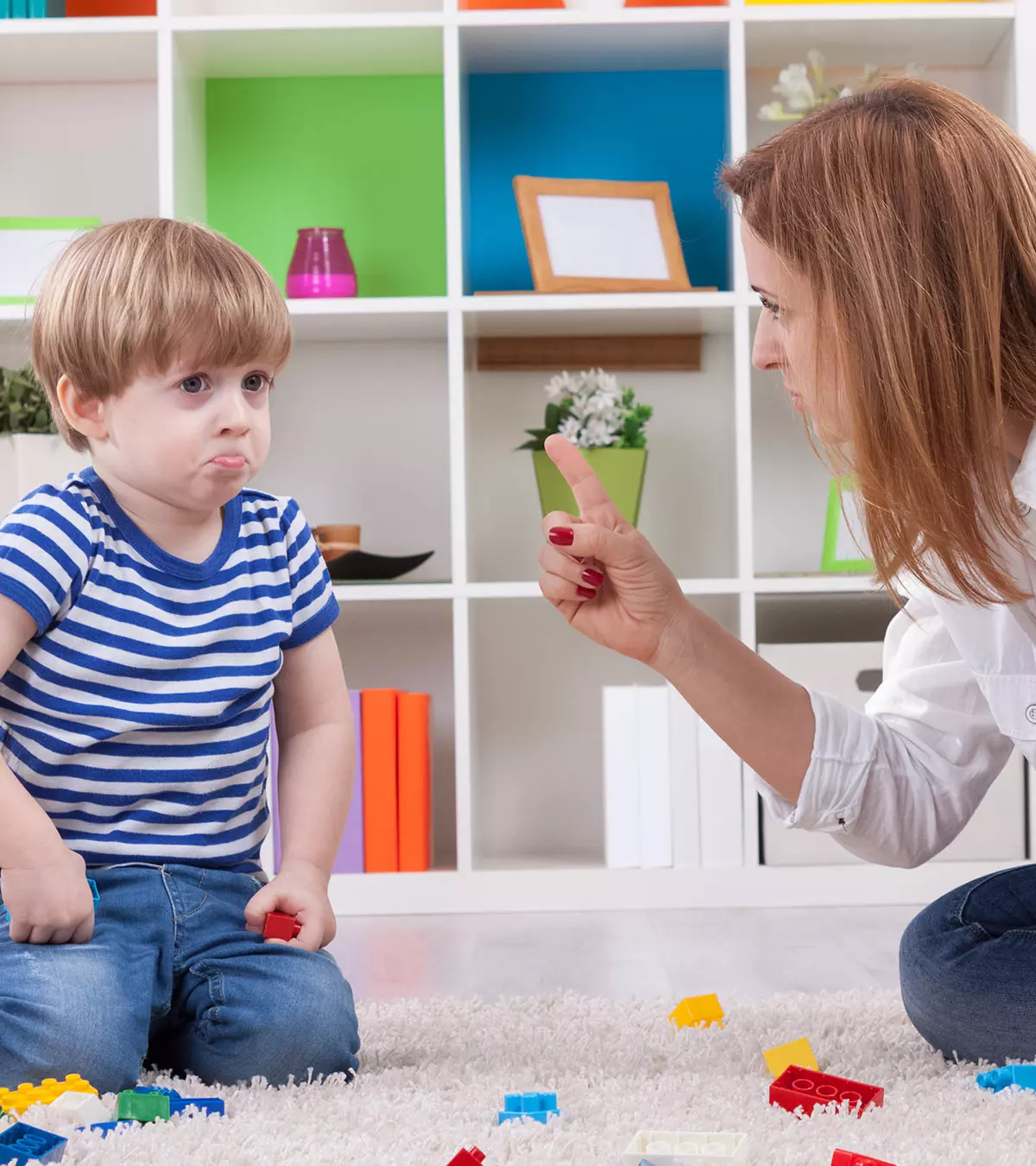
Image: Shutterstock
Parents who have one child can sometimes draw criticism due to the term called ‘only child syndrome.’ Whether or not to have more than one child is entirely up to a parent. It is a widely believed fallacy that a single child with no siblings is not loving and empathetic. They could develop anxiety disorders or become spoilt brats. In this post, we talk about ‘only child syndrome’ its signs. Read on.
Key Pointers
- Studies showed behavioral differences between children who grew up with siblings and those raised as single children.
- However, there is no conclusive evidence to prove that single children are loners, self-centered, or have adjustment problems.
- Being ambitious, less interactive with relatives, and having a higher IQ are a few characteristics of only child syndrome.
Is Only Child Syndrome Real?

When we come across the term ‘only child syndrome’ or ‘a family with one child,’ we reference the 1898 study by the American psychologist E.W. Bohannon. When he first coined the term, he used it as a descriptive adjective to describe a selfish, jealous, lonely, and self-centered nature in single children with overbearing parents (1).
Studies on families with and without only children state that compared to adults who grew up with siblings, those who grew up as single children showed differences in their social behaviors (2).
However, we must understand that the personality and behavior of only children and children with siblings are not dependent merely on the presence or absence of siblings. Multiple factors and experiences influence a child’s personality. Studies conclude that any adjustment problems in single children may derive from the special characteristics of the parents (3).
Sharing an opinion on this educational psychologist Toni Falbo says, “In the United States, the only child stereotype in a nutshell is: selfish, lonely, and maladjusted. So far, that stereotype cannot be confirmed by any empirical social science research (8).”
Characteristics Of Only Child Syndrome
A few key differences have been noticed in studies between children with and without siblings. These positive and negative characteristics, though accurate, may not hold for all single children (1). Let’s have a look at a few of them.
Positive Characteristics Of Only Children
Being raised in a non-competitive environment, only children have a lot of opportunities to develop certain unique traits that may be very helpful to them as they grow up. The following are some such positive qualities in only children.
1. Ambitious
Only children may turn out to be more ambitious, sometimes even more than a first-born with siblings. This has been attributed to the fact that single children get the complete attention of their parents, who are more likely to notice and praise their achievements, which could benefit them.
2. Self-reliant and adjusted

Single children tend to be self-adjusting when it comes to emotions and their parent’s undivided affection makes them emotionally stable. Studies suggest that only children have a deeper bond with their parents (9). Spending a lot of uninterrupted time with their parents makes them feel secure and also enables them to share their feelings openly with trusted individuals. Thus, an only child can rely on themselves to know what they want, decipher their feelings on the matter, and make effective decisions.
3. Independent
Children without siblings can be more independent and tend to have more confidence than those with siblings. This arises from the time they spent in isolation during their growing-up years. They have learned how to entertain themselves and are comfortable being alone.
 Point to consider
Point to consider4. Higher IQ

Single children may have a higher IQ than those with siblings. It could be because they spent more time learning and engaging in extracurricular activities than socializing.
5. Leadership qualities
Single children often demonstrate leadership qualities. This is because they often have to make their own decisions from childhood, as they do not have an older sibling to turn to, and not everything can be resolved by parents. Being an alone child may help them resolve conflicts, analyze arguments, make choices, and lead by example. However, their upbringing also contributes to developing such skills.
6. Being introverted or extroverted
Though people may be extroverted or introverted regardless of their order of birth, single children are prone to be at the extreme side of personality types. Single children may act as extroverts when they wish to make friends as they often lack playmates at home. However, they may also take their time to adapt in a large group, like introverts.
Sharing how her experiences shaped her personality type, Aishwarya writes, “As a grown up, out of 10, I would say I am about a 7 of an extrovert. Sure, there are many other factors for my extraversion, but I know for a fact that me being alone at home gave me the motivation to go up to kids my age or even older to come play with me. My parents also moved a lot when I was growing up and I can remember at least 6 schools that I have studied in but I have never really had any problems making friends. Perhaps things would have been a little different if I had a sibling right at home, allowing me to remain in my comfort zone and not trying as hard to make friends (i).”
Negative Characteristics Of Only Children
Although only children have several appreciable characteristics, they have a few of their flaws which stem from the lack of sibling bonding. Some such negative traits are as follows.
1. Less social

Having a sibling opens one to the possibility of sharing and caring. The National Survey of Families and Households data showed that the adults who grew up without siblings had less social activities than those who had siblings during their growing up years. They also participated differently in sports and school-related activities (2). Being less social may also lead to difficulty in making friends.
However, this does not mean that single children do not share or are filled with loneliness. Since single children do not have siblings to share their life with during their formative years, they could become self-sufficient and less social too. While they may not be anti-social, they may have a smaller friend circle.
2. Lesser interaction with relatives
Siblings usually outlive parents and are present throughout one’s life. This makes them the longest relatives and close family to interact with in their entire life. The 2011 case studies on American adults indicated that compared to people with siblings, there is a chance that single children without relatives may not have this bond and tend to spend less time with relatives or interact with them (2).
 Research finds
Research finds3. Difficulty managing conflict
A 2002 study stated that only children were less likely to be liked by their classmates and had a high chance of being victimized and aggressive in their peer group. This leaves them with insecurity. This throws some light on how having siblings at home can help to manage a conflict better (4).
4. Difficulty meeting expectations
Despite being emotionally well adjusted, only children may experience occasional guilt over receiving such concentrated attention from their parents. They may also feel a sense of responsibility or even fear towards fulfilling their responsibilities and meeting parental expectations. They might feel difficulty coping with the expectations. It’s important to recognize that these dynamics can evolve over time and vary from person to person, as individuals navigate their own unique emotional journeys and relationships with their parents.
5. Less agreeable personalities
Though single children are creative, well-rounded, and intelligent, they tend to score low on agreeable personality traits. A 2011 study conducted in China stated that people who grew up in single-children families tend to be more narcissistic than those with siblings (5).
6. Problems with sharing their things or space
Only children receive a lot of space at home and get their own toys, books, snacks, clothes, shoes, and accessories. They are not compelled to share it with anyone or reuse the things that their siblings used. Thus, they may be extremely possessive about their things and may be unwilling to share. This may also extend to include people at times, especially the parents.
Tips for managing difficult characteristics in only children
Navigating potential challenges such as less empathy and social skills due to difficult characteristics in only children requires conscious parental efforts. Here are a few ways you may consider.
- Encourage the child to participate in family gatherings, play dates, and other community activities to make them more sociable. Also, enroll them in sports and extracurricular activities at school to help them make new friends.
- Teach how to set boundaries with intrusive peers and bullies. Also, encourage assertive communication to help the child negotiate effectively and obtain win-win solutions during conflicts.
- Set realistic expectations on what is responsible behavior both inside and outside the house. Discuss these expectations and consequences for wrongful actions with the child to avoid misunderstandings.
- Spend time with the child and reinforce their good traits to show them that they are special to you. Children are less prone to fight if they believe you appreciate and value them as individuals.
- Encourage the child to take up different pursuits or hobbies to foster creativity. Appreciate their efforts and actively participate in their favorite activities to encourage them to keep going even on difficult days.
- Avoid over-protecting the child or doing things for them that they can do themselves. Encourage them to take up age-appropriate responsibilities and problem-solve independently to help build their self-confidence.
- Role model sharing behaviors at home and encourage the child to engage in them with cousins or peers. This may help reduce their sense of possessiveness.
Key Pointers
- Studies showed behavioral differences between children who grew up with siblings and those raised as single children.
- However, there is no conclusive evidence to prove that single children are loners, self-centered, or have adjustment problems.
- Being ambitious, less interactive with relatives, and having a higher IQ are a few characteristics of only child syndrome.
Frequently Asked Questions
1. What are the disadvantages of being an only child?
Some disadvantages of being an only child are that they cannot share their feelings on a daily basis which can sometimes lead to occasional bouts of depression. Some other disadvantages of being an only child are that they may face difficulty adjusting to the extra parental pressure placed on them to excel in academics and extracurricular activities. They may be under extra parental pressure to perform well in academics and extracurricular activities. In addition, they may also have to find ways to play, entertain, and self-motivate themselves without a sibling.
2. Are parents of only children happier?
Although there is not much research to confirm this statement, one study demonstrated that a mother’s mental health might improve after her first child’s birth. However, a second child’s birth could impact a father’s psychological well-being (6) Tiana Zarella, a blogger, talks about how being an only child has both good and bad aspects. Speaking about her parents’ overprotectiveness, she says, “I feel as though growing up I always wanted to be older… I always looked forward to when my birthday would come around and I would be another year older and just maybe my parents would let me do more activities without them than the previous year. That is what it’s like to be an only child.”
However, she also adds, “My parents aspire to me as being able to accomplish great things, as many other parents would want for their children as well… Would I change a thing? NO. I love being an only child, I wouldn’t trade it for the world. From a young age I demanded that being an only child was the best thing, and I know now that I was not wrong (ii).”
3. How might the parent-child relationship differ for an only child compared to a child with siblings?
Parents of an only child can devote more individual attention and resources to that child. They may have more time and energy to invest in their child’s needs, education, and activities. On the other hand, parents with multiple children may need to divide their attention and resources, which can lead to less one-on-one time with each child. For an only child, their relationship with their parents may be more intense and centered around the parent’s expectations, as no other siblings can share that focus. Children with siblings, on the other hand, might experience a wider range of relationships, including sibling rivalry, cooperation, and shared experiences.
4. Are there any cultural or societal factors that may influence the perception of only-child syndrome?
Some societies strongly prefer larger families, where having multiple children is seen as desirable and advantageous. The idea that only children might suffer from certain disadvantages or developmental issues can gain traction in such societies. In societies where sibling relationships are highly valued and play a significant role in socialization, there may be a tendency to view only children as lacking certain social skills or experiences from growing up with siblings. This perception can contribute to the notion of only-child syndrome.
5. What are some similarities and differences between firstborns and only children?
Firstborns and only children may share some similarities, as both positions involve being the sole focus of parental attention for a significant period. The firstborns often receive much attention and responsibility from their parents, leading to higher expectations and pressure to succeed. On the other hand, only children grow up without the experience of having siblings. They may have a closer relationship with their parents, as they do not have to compete for attention or resources.
6. Can the experience of only child syndrome vary depending on factors such as gender or parental involvement?
Gender can influence socialization experiences and expectations within a family. For example, societal norms may place different expectations on boys and girls, affecting their interactions and relationships within the family and beyond. These gender-specific expectations and experiences can shape an only child’s development, but it’s important to remember that individual personality and temperament also play significant roles. Children who receive consistent emotional support, guidance, and opportunities for social interaction tend to have healthier socioemotional development. Parents who actively engage with their children, provide opportunities for peer socialization, and promote independence and self-confidence.
7. How might the parenting style of parents with only children differ from those with multiple children?
Raising an only child allows parents to tailor their approach more specifically to that child’s needs and interests. They can often devote more attention and focus to that child since they don’t have to divide their time and energy among multiple children. This can lead to a closer parent-child bond and a higher level of involvement in the child’s life. Parents with multiple children often encourage independence and self-reliance earlier due to the need to manage various responsibilities. In contrast, parents with only children may be more likely to engage in activities or tasks that the child could do independently, inadvertently fostering a greater dependence on the parents.
8. Are only children spoiled and lonely?
Despite what many people believe, only children are not spoiled or lonely. Research shows that they are just as socially skilled and well-adjusted as children with siblings (7). While they don’t have brothers or sisters to play with at home, they make friends at school and participate in different activities. A child’s growth isn’t shaped by only the size of their family, but also how they’re raised and their home environment.
Having a single child is a personal choice. Planning another child to ensure that your child doesn’t get spoilt is incorrect. Remember, babies, toddlers, and young children throw tantrums and often exhibit behavioral problems, but that doesn’t always indicate that the child is suffering from the only child syndrome. Yes, having a sibling helps shape one’s behavior. However, it isn’t the only factor that decides how a child will behave. Positive parenting practices, social experiences, and guidance at school are a few additional factors that impact a child’s behavior.
Infographic: Common Myths About An Only Child
Being an only child or a parent to an only child, you may have heard people saying, “It must get lonely for you” or “Oh! You must have spoiled him/her a lot.”
These common misconceptions about an only child need to be debunked. So check this infographic out to learn the common stereotypes associated with an only child and save it to give the people a fact check. Illustration: Momjunction Design Team
Illustration: Characteristics That Make Only Child Syndrome Real

Image: Dall·E/MomJunction Design Team
Personal Experience: Source
MomJunction articles include first-hand experiences to provide you with better insights through real-life narratives. Here are the sources of personal accounts referenced in this article.
i. What it is Really Like to be an Only Child.https://medium.com/@aishwaryapanchal/what-it-is-really-like-to-be-an-only-child-5ae2ec0906c
ii. Does being an only child suck?;
https://medium.com/@tzare716/does-being-an-only-child-suck-53da9d31f6c9
References
- Only child syndrome: Bursting the stereotypical bubble.
https://www.rfhospital.org/news/online-coverage/2023/june/only-child-syndrome-bursting-the-stereotypical-bubble - K Trent, G D. Spitze, Growing up without siblings and adult sociability responsibilities, 2012;
https://www.ncbi.nlm.nih.gov/pmc/articles/PMC3237053/ - T Falbo, The only child: A review, Journal of Individual Psychology; 1977;
https://psycnet.apa.org/record/1979-13076-001 - K M. Kitzmann et al.; Are Only Children Missing Out? Comparison of the Peer-Related Social Competence of Only Children and Siblings, Journal of Social and Personal Relationships;
https://journals.sagepub.com/doi/10.1177/0265407502193001 - H Cai, V S. Y. Kwan, C Sedikides, A Sociocultural Approach to Narcissism: The Case of Modern China, European Journal of Personality;
https://onlinelibrary.wiley.com/doi/abs/10.1002/per.852 - Leah Ruppanner et al. (2018); Harried and Unhealthy? Parenthood Time Pressure and Mental Health.
https://onlinelibrary.wiley.com/doi/abs/10.1111/jomf.12531 - Only children are often misunderstood. Take a closer look at the science.
https://www.apa.org/monitor/2024/09/only-children#:~:text=Research%20indicates%20that%20the%20commonhas%20more%20than%20one%20child. - Only children are often misunderstood. Take a closer look at the science.
https://www.apa.org/monitor/2024/09/only-children?utm_source=linkedin&utm_medium=social&utm_campaign=apa-monitor&utm_content=only-children&trk=public_post_main-feed-card-text - Yixiao Liu and Quanbao Jiang; Who Benefits From Being an Only Child? A Study of Parent–Child Relationship Among Chinese Junior High School Students.
https://www.frontiersin.org/journals/psychology/articles/10.3389/fpsyg.2020.608995/full
Community Experiences
Join the conversation and become a part of our nurturing community! Share your stories, experiences, and insights to connect with fellow parents.
Read full bio of Dr. Holly Schiff
Read full bio of Dr. Meenakshi Maruwada
Read full bio of Rebecca Malachi
Read full bio of Apoorva K
















